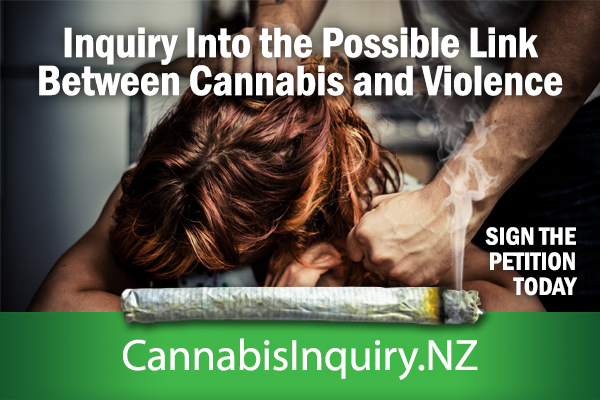
The New Zealand Medical Journal 25th October 2019, Volume 132 Number 1504
Family First Comment: In a first for us, we had a letter published in the New Zealand Medical Journal 🙂
It explains the reason for our calls for an investigation into the possible link between cannabis, psychosis and violence. Emphasis on ‘possible’.
Drug proponents like Alison Mau, Chloe Swarbrick, the Drug Foundation and even members of the Prime Minister’s ‘expert’ panel investigating legal cannabis hate even the mention of this topic. Why are they so opposed?
Read our letter.
A response to “What we know, and don’t know, about cannabis, psychosis and violence”,1 Boden and Spittlehouse (26 July 2019).
In May 2019, as calls for the legalisation of cannabis grew ever louder, and with the upcoming referendum on legalisation in 2020, Family First launched a petition asking the government to first investigate the possible link between cannabis and violence. Emphasis on ‘possible’. We raised the issue for good reason.
Over the past couple of decades, studies around the globe have found that higher levels of THC—the active compound in cannabis—is strongly linked to psychosis, schizophrenia, and violence.
And with increasing THC levels being found in marijuana products consumed via edibles, vaping and dabbing, the risk is growing. In Colorado the average THC content of all tested flower in 2017 was 19.6%, and for concentrated extract products, 68.6%.2 Potency rates can now be as high as 99.9%.3
Researchers have studied alcohol and violence for generations, proving that alcohol is a risk factor for domestic abuse and assault. Far less work has been done on cannabis. And that’s effectively the work that we’d like to see done—before we move to legalise it. We would argue that the evidence is already building.
A recent study in The Lancet concluded that “people who smoked marijuana on a daily basis were three times more likely to be diagnosed with psychosis… For those who used high-potency marijuana daily, the risk jumped to nearly five times.”4,5
This follows research last year which found that frequent marijuana use was associated with intimate partner violence,6 similar to a 2011 study.7
Research published in 2016 in the journal Psychological Medicine concluded that continued cannabis use is associated with seven-fold greater odds for subsequent commission of violent crimes.8
As with all research, there are limitations in the studies mentioned above. But those same limitations also apply to studies which say there is no association.
The United Nations Office on Drugs and Crime (UNODC) summed up the issue in their 2012 report, saying that the increasing potency of cannabis can increase psychotic symptoms in regular users.9
The new paper “Cannabis use and violence in patients with severe mental illnesses: A meta-analytical investigation” is the most comprehensive survey yet on the issue.10 Findings showed a moderate cannabis-violence association in severe mental illness. What’s also striking is how recent most of the papers examined are—10 of the 12 papers are in the last decade, and 7 of the 12 since 2016.
Just this year, more than 40 clinicians, researchers and scientists from Massachusetts, including many from Harvard Medical School, released a Statement of Concern, highlighting negative effects of THC—“Increased risk of serious mental health problems including acute psychosis (eg, hallucinations, delusions), paranoia, schizophrenia, depression, anxiety and suicide, with growing scientific evidence that daily use of high THC products bring greater risk”.11
They highlighted 2018 research from the Copenhagen University Hospital which found that “41% of those who experience cannabis-induced psychosis later convert to schizophrenia.”12
Recently in Vermont, the Department of Mental Health warned legislators, stating, “…multiple studies have linked regular cannabis use to an estimated doubling of the risk of a psychotic illness… Violent behaviour as a result of cannabis-induced paranoia and other psychotic symptoms is also an increasing concern”.13
In Maryland, neuroscientist Christine Miller warned legislators, “The causal link between marijuana use and the development of psychosis is quite simply the most well-replicated, high-impact finding in schizophrenia research today. Given current use rates and the strong potency of the drug available, it stands to be responsible for a larger proportion of schizophrenia cases than any other established factor…”14
In the same way that there is some real evidence that components of marijuana can be made into medicine, there is building scientific evidence suggesting that components of the plant can at times lead to mental illness, at times severe, that can lead to violence.
It is interesting that Boden and Spittlehouse agree with Family First that “more research is needed on the possible linkages between cannabis exposure and violence.”
We are simply asking for research and scientific consensus, before moving forward as a country with a change this massive. We believe this to be a responsible and thoughtful way to move forward.
https://www.nzma.org.nz/journal/read-the-journal/all-issues/2010-2019/2019/vol-132-no-1504-25-october-2019/8030
